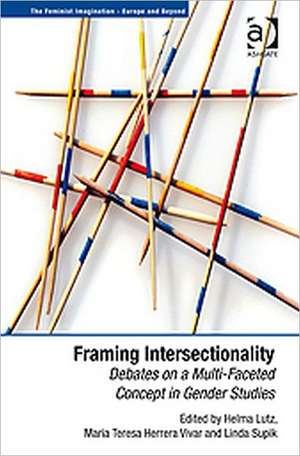Framing Intersectionality: Debates on a Multi-Faceted Concept in Gender Studies: The Feminist Imagination - Europe and Beyond
Editat de Helma Lutz, Maria Teresa Herrera Vivar, Linda Supiken Limba Engleză Hardback – 21 apr 2011
| Toate formatele și edițiile | Preț | Express |
|---|---|---|
| Paperback (1) | 299.87 lei 6-8 săpt. | |
| Taylor & Francis – 28 apr 2011 | 299.87 lei 6-8 săpt. | |
| Hardback (1) | 878.73 lei 6-8 săpt. | |
| Taylor & Francis – 21 apr 2011 | 878.73 lei 6-8 săpt. |
Preț: 878.73 lei
Preț vechi: 1179.99 lei
-26% Nou
Puncte Express: 1318
Preț estimativ în valută:
168.16€ • 174.57$ • 140.22£
168.16€ • 174.57$ • 140.22£
Carte tipărită la comandă
Livrare economică 22 martie-05 aprilie
Preluare comenzi: 021 569.72.76
Specificații
ISBN-13: 9781409418986
ISBN-10: 1409418987
Pagini: 256
Dimensiuni: 156 x 234 x 22 mm
Greutate: 0.63 kg
Ediția:1
Editura: Taylor & Francis
Colecția Routledge
Seria The Feminist Imagination - Europe and Beyond
Locul publicării:Oxford, United Kingdom
ISBN-10: 1409418987
Pagini: 256
Dimensiuni: 156 x 234 x 22 mm
Greutate: 0.63 kg
Ediția:1
Editura: Taylor & Francis
Colecția Routledge
Seria The Feminist Imagination - Europe and Beyond
Locul publicării:Oxford, United Kingdom
Recenzii
'Finally here it is: the long awaited state-of-the-art textbook on intersectionality with a predominantly European slant. It is both a thickly descriptive and a steeply theoretically embedded endeavour. Tracing the European "success story" of a traveling concept, we are sensitized to intersectionality's multiple manifestations in a European context, which also depend on the national theoretical preoccupations which preceded it and on linguistic cultural capital.' Gloria Wekker. Utrecht University. The Netherlands 'This collection captures the very pliability of intersectionality through deep description, creative application and original research. Its robust intellectual heft is showcased through explorations of masculinity, labor movements, embodiment, and migration. A much-appreciated engagement with one of the most theoretically significant interventions of the past two decades, it represents the continued unfolding of intersectionality and its new generation of possibilities.' Lisa Jean Moore, State University of New York, USA 'This volume may well serve as a manifestation of the critical theoretical engagements that intersectionality compels. There are both discernible similarities and prominent disagreements in these author’s dialogues, which are in my opinion precisely what Kathy Davis sees as the working of a good feminist theory. As such, this volume surely puts another mark on its traveling trajectory, and makes ripple on the butterfly chain of feminist politics of transformation.' Nordic Journal of Migration Research 'Framing Intersectionality: Debates on a Multi-Faceted Concept in Gender Studies provides a comprehensive overview of differing definitions, discussions and usages of this ’chimerical’ concept (p. 45), with a focus on the European context.' Irish Journal of Sociology
Cuprins
Preface 1. Framing intersectionality; an introduction Section I: Intersectionality's Transatlantic Travels – Geographies of the Debate 2. Demarginalizing the intersection of race and sex: a Black feminist critique of antidiscrimination doctrine, feminist theory, and antiracist politics 3. Intersectionality as buzzword: a sociology of science perspective on what makes a feminist theory successful 4. The discursive politics of feminist intersectionality Section II: Emerging Fields in Intersectionality: Masculinities, Heteronormativity and Transnationality 5. Marginalized masculinity, precarization and the gender order 6. Neglected intersectionalities in studying men: age/ing, virtuality, transnationality 7. Exposures and invisibilities: media, masculinities and the narratives of wars in an intersectional perspective 8. Sexuality and migration studies: the invisible, the oxymoronic and heteronormative othering 9. Psychosocial intersections: contextualising the accounts of adults who grew up in visibly ethnically different households Section III: Advancing Intersectionality: Potentials, Limits and Critical Queries 10. Beyond the recognition and re-distribution dichotomy: intersectionality and stratification 11. Embodiment is always more: intersectionality, subjection and the body 12. Intersectional invisibility: inquiries into a concept of intersectionality studies 13. Intersectional analysis: black box or useful critical feminist thinking technology? Postscript
Notă biografică
Helma Lutz is Professor of Women's and Gender Studies at Goethe University, Frankfurt, Germany.
Maria-Teresa Herrera Vivar, MA is a scientific staff member at the chair of Women's and Gender Studies, Goethe University, Frankfurt, Germany.
Linda Supik is a scientific staff member at the chair of Women's and Gender Studies, Goethe University, Frankfurt, Germany.
Maria-Teresa Herrera Vivar, MA is a scientific staff member at the chair of Women's and Gender Studies, Goethe University, Frankfurt, Germany.
Linda Supik is a scientific staff member at the chair of Women's and Gender Studies, Goethe University, Frankfurt, Germany.
Descriere
Originally conceived by Kimberlé Crenshaw in 1989 as a tool for the analysis of the ways in which different forms of social inequality, oppression and discrimination interact and overlap in multidimensional ways, the concept of 'intersectionality' has attracted much attention in international feminist debates over the last decade. Framing Intersectionality brings together proponents and critics of the concept, to discuss the 'state of the art' with those that have been influential in the debates that surround it. Exploring issues such as migration, identity, media coverage of sexual violence against men and transnational livelihoods of high and low skilled migrants, this book will be of interest to researchers in the fields of gender, women's studies, masculinity, inequalities and feminist thought.




















